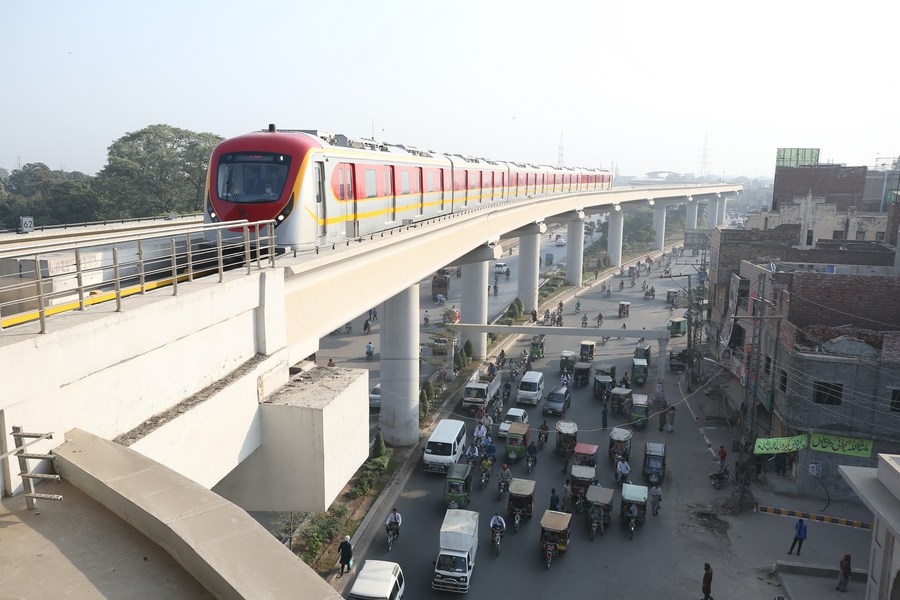CPEC delivers on promise to benefit Pakistani people in pandemic-ravaged 2020
In the year of 2020 when the world was hit by the COVID-19 pandemic, factories have stopped roaring, people stayed at home, fearing of contracting the virus. However, projects of the China-Pakistan Economic Corridor (CPEC) have kept proceeding, offering a beacon of hope for Pakistan that has been longing for a recovery from the pandemic and a takeoff of its economy.
As night fell, 30-year-old Aisar Uddin called on his families in Hunza as usual. This time though, he was making sure whether his sister had received the money he had sent back home for her school fees.
Unlike some of his friends who lost their jobs due to the ravaging COVID-19 pandemic and have been suffering till now, a stable income Uddin earns from the job in Port Qasim power plant in the southern port city of Karachi enables him to support his families and survive this hard time.

A train for the Orange Line arrives at a subway station in Lahore, Pakistan, Oct. 26, 2020. (Xinhua/Liu Tian)
In a year when the world was hit by the pandemic, factories have stopped roaring, people stayed at home, fearing of contracting the virus. However, projects of China-Pakistan Economic Corridor (CPEC) have kept proceeding, offering a beacon of hope for Pakistan that has been longing for a recovery from the pandemic and a take-off of its economy.
From Rashakai special economic zone in the country's northernmost province of Khyber Pakhtunkhwa to southern Gwadar port on the Arabian Sea, CPEC has delivered on promise to benefit local people.
Muhammad Dawood Khan joined the Suki Kinari (S K) Hydropower Project in Naran Kaghan valley of District Mansehra this November when the second wave of the pandemic started sweeping through the South Asian country.
"The company offered me very handsome package and attractive allowances. Why should I turn down a job with competent working environment, professional behavior of staff and learning opportunities?"
On the other hand, said Khan, S K hydro has been striving for betterment and achieve its targets even during this pandemic situation. All of these makes him feel proud to choose the company.
For Uddin, a virus-free working environment is also what he needs besides a stable income. The zero-affected rate of the contagious virus among workers of CPEC projects gives employees like Uddin and their families consolation.
Chairman of the CPEC Authority Asim Saleem Bajwa said earlier that CPEC projects have achieved major progress despite grave economic and health challenges posed by the COVID-19 pandemic, ensuring economic stability and well-being of the people of Pakistan.
On Oct. 25, Pakistan's first ever metro train service, the Orange Line, started its commercial operation in the country's historical city of Lahore, opening a new stage for the South Asian country in the public transportation sector.
During the five years of construction, the Orange Line created over 7,000 jobs for locals, and in the operation and maintenance period it will create 2,000 employment for locals.
The eco-friendly mass transit project is believed to be helpful in addressing the congestion problem of the capital city of Punjab province.
It will lead to green GDP growth, further promote urban development and modernity of the Pakistani eastern megacity and increase economic activities, said the Chief Minister of Punjab Sardar Usman Buzdar during the inauguration ceremony of the metro's commercial operation.
"The number-one group this train will benefit is women - they don't usually have their own vehicles," says a Pakistani politician Kiran Imran Dar quoted by media.
Research shows that women in Pakistan are much more dependent on public transport than their male counterparts are, because they have less access to other travel modes such as motorbikes.
In fact, an increasing number of women are joining the CPEC projects, strengthening the "she power" in the sub-continent country.
"Being a woman, I am well respected and appreciated for my contribution to the project," said Saima Nawaz, an advisor of legal and commercial department at S K Hydro (Private) Limited.
"It is an opportunity to be part of CPEC project which feel like being part of history in making which will change the face of sub-continent," Nawaz noted.
This is echoed by Altaf Shahid, a Karachiite who works as a design and project engineer in Port Qasim power plant. "It is pride for me as I'm directly involved for the development of my people and for my country," said Shahid.
This pride and honor will continue when benefits are relayed to the next generation. By providing a better education, the fate of the nation will be changed.
Vocational training is being provided to enable local population to participate and get fully benefited from the development projects under CPEC, noted the CPEC Authority chairman during a webinar convened by Pakistan-based think tank the Sustainable Development Policy Institute.
After chatting with his elder brother on phone, Shahid has a clearer plan for the future. "I will save the money into bank for the education of my children. By receiving better education, I am sure they will have a brighter future," said Shahid.

